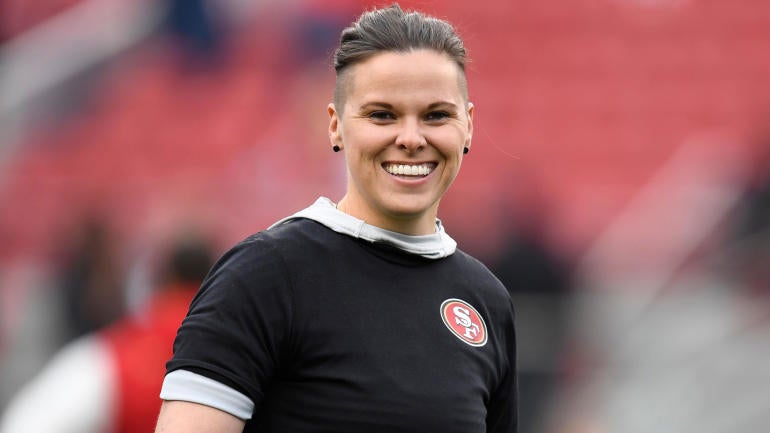
In 1973 there was perhaps no one more qualified for - or with more of a direct line to - a job in the NFL than Sheila Ford Hamp.
Today she's the principal owner of the Detroit Lions, but back then she had just graduated Yale University as a member of their first class of women. She had athletic bona fides through playing collegiate tennis. And she was the daughter of Lions owner William Clay Ford Sr., who took her to NFL meetings that got her company with then-NFL commissioner Pete Rozelle.
But when she went to Rozelle looking for a job within the league, he had nothing for her.
"I know he tried because he liked me and thought it would be fine, but he couldn't think of one thing - nothing - that a woman could do in the NFL," Ford Hamp said Wednesday during the fifth annual NFL Women's Careers in Football Forum, a two-day virtual event for dozens of women aspiring for roles in the NFL.
"So I'm thinking how far we've come," she continued. "I really think for you guys that are on this panel, it's fabulous. Make your connections. Get to know people. Get your foot in the door any which way you can, and I think you can do whatever you want."
The NFL selected 40 women, with three-quarters of them being women of color, to participate in the event that's normally held in person during the NFL Scouting Combine in Indianapolis. This week's panel of guests included among others three team owners, seven head coaches, seven GMs and female assistant coaches Jennifer King and Lori Locust.
The forum's purpose is to help women, most of whom are working in college ranks today, build connections within the NFL to improve the pipeline of female coaches, scouts and front office personnel. In the past four years, the league counts 118 opportunities for women in these various roles.
This was my first time sitting in on the forum, and I found the first day's panel to be full of great advice for anyone trying to break into any industry. But specifically for women in football, the theme of the day was "passion for football," as coaches, GMs and owners all explained.
"The thing that stood out about Jennifer is, she wanted it," Washington coach Ron Rivera said of King, the first Black female full-time assistant in NFL history. "She wanted to be involved in coaching football, more so than anything else. That was one of the things that I took from having her around."
King, who played women's tackle football from 2006 to 2019, noted there are very limited opportunities to have played the sport for women who aspire to be coaches but urged participants not to dwell on that. Plenty of coaches in today's NFL ranks didn't play the game at a high level, and intangibles like the ability to communicate and teach can set anyone apart.
Locust, the assistant defensive line coach for the Buccaneers, said she came to her first forum years ago with coaching experience but was looking for an NFL internship before landing one with the Ravens. She provided real-life examples for how women can improve their football knowledge right now.
"I'm a big proponent on clinics," Locust said. "I'm a big proponent on calling your local high school and seeing if somebody will allow you to sit in and watch film and teach you how to break down film and teach you some of the concepts and the things that will start to make sense to you.
"Overall, it's an amazingly violent chess game. And if you can understand the 'if this then that' type of mentality, if you have the ability to see it as a big picture and be able to break it back down to a very granular level, and you have the ability to communicate and teach and you have a passion for it... don't worry about the fact that you didn't get an opportunity to play or the fact that you're a female. Speak on what you know, take in as much as you can, learn from whoever you can, and you'll form your own style."
Eight women served as assistant coaches during the 2020 season, which was up from two in the previous two seasons and zero as recently as 2015. Those in positions to hire minorities, be them women or people of color, have to value diversity and what it brings to an organization. Head coaches such as Rivera and Bruce Arians have done that. So, too, have organizations like the Cleveland Browns and San Francisco 49ers.
New York Jets head coach Robert Saleh, the first Muslim-American coach in NFL history, was previously the 49ers defensive coordinator. On Wednesday, he referenced Katie Sowers, a four-year offensive assistant, and Salli Clavelle, the first Black female scout, as a "a demonstration in terms of what kind of reach the NFL is trying to have and where it's trying to get to. The reputation that it does have with regards to not seeing color, not seeing gender and just wanting the best people possible to work."
Though the league has undoubtedly made progress as it relates to diversity, there's little question that teams see both color and gender and decide to hire white males instead. We know through anecdotal evidence and dozens of studies that the NFL is not a meritocracy when it comes to hiring practices.
A female director of football operations at a Division-III school asked Wednesday how she could close the gap between where she works now and working within operations in the NFL.
Replied Saleh: "I think it all starts with relationships. This whole thing is built off relationships. Sometimes you hear the criticism of the NFL that it's a buddy, good-ole-boy system or whatever it is, but really there are relationships that are built at the very entry level of relationship building, if you will. I think this forum is an unbelievable start, especially when we can get back to doing it in person and being able to make the connections."
Much like any major American industry, networking and who you know is key, and that's why this week's forum with several team decision makers is so vital. But pretending there's no good-ole-boy system in the NFL does no one any good.
In a 46-page report published by the NFL in 2020, research provided by the league determined nine of the 32 head coaches were either the son or father of a current or former NFL coach. Furthermore, 63 coaches (including coordinators and position coaches) were biologically related or related through marriage, with 53 of those coaches being white.
"Clearly, we have a systemic problem that is related to an "ism" that is talked about less than racism yet is just as detrimental to equity and inclusion: cronyism," wrote Dr. C. Keith Harrison, the lead investigator and researcher for the report.
As qualified for NFL roles as these women are or may become, there still has to be an intentionality from those in hiring positions. And Brad Holmes, the first-year Lions GM, had advice on how to best prepare for the interview when given the opportunity.
He said beyond believing in yourself and researching who and what you're interviewing for, rehearse your answers and record yourself.
"Utilize technology. Phone, iPad," Holmes said. "In personnel we watch all this film and try to get the answers to the test. Well... watch yourself and see if you can get some answers. See your body language. See if you're excited. See if you feel excited. Your excitement about the job means a lot, and there's going to be more desire to hire someone who wants to be there."
Everyone was in unison about what to do once you get the job: be a value-add. Work hard. Be detailed. Do your job. Make the team better.
"In my role we get a lot of problems thrown at us and not enough solutions," said Dolphins head coach Brian Flores. "So are you a problem solver? Do you have solutions? People who have solutions, I'm not going to let you leave my building. I'm going to make it very hard for you to leave my building."
















